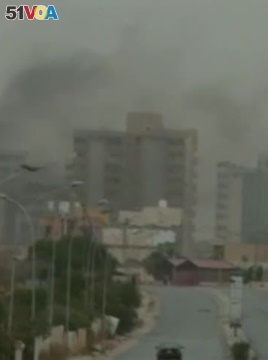May 20,2014
WASHINGTON — An outbreak of violence in Libya's two largest cities has sparked fears of an imminent civil war in the country that has been ruled by rival militias since the ouster of longtime ruler Moammar Gadhafi in 2011.
Forces loyal to retired general Khalifa Haftar left a trail of destruction in Tripoli Sunday before leaving the city. Libya's army chief ordered the deployment of Islamist-led militias Monday to secure the capital, but Haftar remained defiant.
"All the forces are there and they are getting ready.

Haftar's forces have declared Libya's interim government dissolved, sparking fears of a widespread civil war. The danger is real, said Klaus Larres, professor of international relations at the University of North Carolina.
"We have over 1,700 military groups, small fringe military groups in Libya. Some are Islamist, some are non-Islamist, but they all fight each other and the only thing which unites them and that united them was the opposition against Gadhafi, and now they are really looking for a cause, and the cause really is to gain power and to obtain as much economic gain, as much economic loot as they can," said Larres.
Haftar's forces staged a major attack on Islamist militias in Benghazi Friday. His extended life in the United States and the West's apprehension of fundamentalist groups have fueled speculation that the retired general enjoys Western support. Middle East expert Steve McInerney told al-Hurra television there is no evidence of that. He blames the unrest on the interim leaders' failure to consolidate power and build a strong national force.
"I also believe the international community has failed Libya in this regard. I think there should have been for quite some time much more serious efforts at reforming the security sector in Libya and providing the support needed to build up a strong national force," said McInerney.
Ordinary Libyans - like Tripoli resident Taha Abdulall - decry the violence.
"What happened should never have happened. We Libyans should have reconciliation between us. May God guide his people and may God bless this country. I want to say to all the Libyan people that we should stand by the government and support the legitimate authorities of the country,” said Abdulall.
U.S. State Department spokeswoman Jen Psaki called on the sides to seek a peaceful resolution.
"Libya has many challenges, and we're aware of that. We believe they cannot be overcome if its leaders don't settle differences through dialogue and work together,” said Psaki.
Three years after the revolution that removed longtime dictator Moammar Gadhafi from power, Libya's planned new constitution is yet to be written, while rival groups fight to determine what kind of state the country should become.